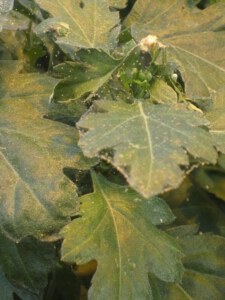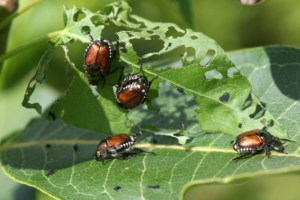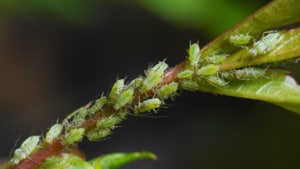Protect Your Landscape from Insect Pests
Insect pests cause significant damage to gardens and landscapes. In our service area on Chicago’s North Shore and Southeastern Wisconsin, we see the evidence of this every day. Although not all insects are harmful, the damage potential from insect pests can be huge. In fact, insects cause more damage to your garden than any other type of pest.
Once established, the cost to get rid of insect pests can be significant. The resulting damage can ruin the appearance of your home landscape. So, be proactive! Keep a close eye on your plants and trees to prevent an infestation – look for signs of damage and disease. Plants that are stressed due to drought are especially susceptible to damage. Also, their growth can be adversely affected.
Insects can harm any part of a plant and at any stage of its development. In serious cases, pests may even kill plants. Sucking insects may transmit disease from infected plants to healthy plants. Even trees can be subject to harm and complete loss, due to insect pests. For example, the emerald ash borer has done significant damage in our area. The beetle has contributed to tree loss by eating the tissue under the tree bark.
Be vigilant in checking plants and taking action before things get out of control. Early detection and treatment can be the difference between saving and losing a prize specimen. Keep in mind that effective treatments, such as chemical insect sprays, may also harm or kill beneficial insects. To avoid this, it’s a good idea take advantage of expert resources:
- Contact Chicago Botanic Garden’s Plant Information Service for helpful information and advice.
- Invest in a bug ID book or visit the website links below to see photos and learn about insect pests.
- Call us at Van Zelst for help in identifying and treating your garden for insect pests: 847-243-6587.
Get to Know these 3 Insect Pests
The number of pest species is large! Become familiar with our top 3 insect pests, so you can identify them and protect your plants from damage.
Two-spotted spider mite
| Latin Name: | Tetranychus urticae |
| Description: | Small, tiny, wingless creature that is difficult to see without a hand lens or magnifying glass |
| Where they live: | Undersides of leaves |
| Plants affected: | Annuals, perennials, trees, and shrubs |
| Harm to the plant: | Sucks the fluid from the leaves which creates small dots or specks – also creates a fine network of webs that cover stems and leaves |
| Discouraging damage: | Keep plants well-watered – Chemical control only as last result |

Japanese Beetles
| Latin Name: | Popillia japonica |
| Description: | Metallic green insects that emerge in July and feed for 4-6 weeks |
| Where they live: | On plants, grubs live in grass |
| Plants affected: | Over 300 types of plants |
| Harm to the plant: | Chew on plants leaves and flower tissue, can create extensive damage and leaves will fall from the plants, grubs feed on the roots of grass causing brown patches |
| Discouraging damage: | Hand pick the beetles or knock them into a bucket of soapy water – best to do this in the early morning |

Aphids
| Latin Name: | Aphidoidea |
| Description: | Small, soft-bodied insect – reproduces many times a year – easy to spot in clusters, usually wingless |
| Where they live: | On plants |
| Plants affected: | New succulent shoots, buds and leaves, perennials, annuals, shrubs, trees, vegetables |
| Harm to the plant: | Leaves and stems can become yellow, distorted or curled – produce honeydew secretion which can cause growth of sooty mold (a harmless black fungus) |
| Discouraging damage: | Spray plant with water to knock them off – insecticidal soap can be used with caution |

Helpful Resources about Insect Pests
- Van Zelst, Inc.
Bugs and Garden Thugs - Illinois Department of Agriculture
Insect Pests - University of Illinois Extension
Insect Control - Chicago Botanic Garden
Garden Pests & Problems
Insect Pests: Is Something Bugging Your Garden? - Morton Arboretum
Help with Pests
Identify Insect Pests and Protect Your Landscape
Insect pests cause significant damage to gardens and landscapes in our area. Be proactive – learn about insect pests, monitor your garden for unwanted visitors, and take action to prevent infestation and damage to your special landscape.
Call the experts at Van Zelst for information and assistance with insect pests: 847-243-6587.